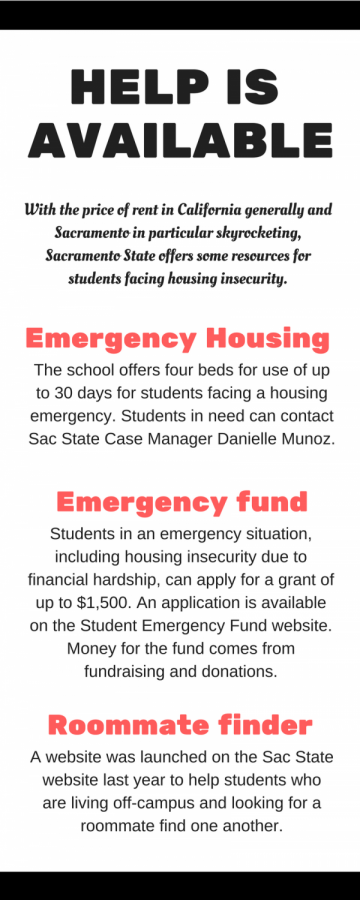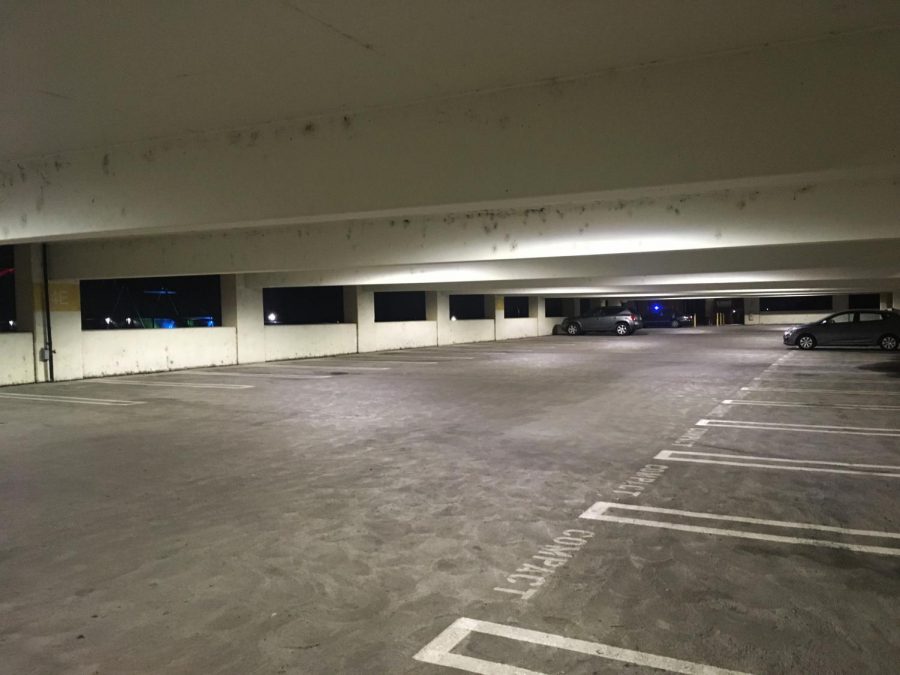New legislation offers homeless college students parking on campus overnight
Bills in California legislature aim to address student housing insecurity throughout state
Sami Soto – The State Hornet
A few cars sit in a parking lot at Sacramento City College during the night. A new bill would allow homeless students at California Community Colleges to park their cars in campus parking lots overnight.
February 19, 2019
A new bill introduced late last month looks to give homeless students a place to sleep at night — in school parking lots.
California Community Colleges (CCC) with parking facilities would be required to allow students to park overnight if Assembly Bill 302 is passed. AB302 was introduced on Jan. 29 by Assemblyman Marc Berman (D-Palo Alto).
“The intent of this bill is to give students an additional level of security because the community colleges must develop a plan, which will need to include safety for the homeless students,” Berman said.
There is no minimum amount of units which the student would have to be enrolled in, but the student would have to be in good standing and have enrollment fees paid.
These requirements mirror those found in Assembly Bill 1995 — which allows all CCC students access to showers on campus. AB 1995 was signed into effect in 2016 by California’s former Governor Jerry Brown.
Berman says there may be costs associated with implementing overnight parking, which will vary by campus. The bill has not yet been heard by the appropriations committee, so there is no estimate of the costs.
Across the state, several CCC’s are coming up with a variety of different solutions to address the problem of housing insecurity and homelessness among students.
A 2017 survey titled “Food, Housing, and Basic Needs Resources Survey” from the CCC’s Chancellor’s Office found that several schools are offering students emergency rental assistance and even financial coaching.
Shahera Hyatt, director of California Homeless Youth Project, says more is being done to tackle the problem of student homelessness because of new research.
“I would say this movement on college homelessness has been first of all student led. And second of all bolstered by new research,” Hyatt said. “I think homelessness has always been a problem, but now it’s kind of come to a head.”
Since 2016, all CCC’s and CSU’s are required to designate a staff member on campus to serve as a homeless and foster student liaison under the Success for Homeless Youth in Higher Education Act (AB 801). Schools in the UC system are requested but not required to follow the law.
According to a UC spokesperson, all nine UC campuses do have basic needs teams that assist students with food and housing needs, as well as emergency aid.
A Problem Across California
The “Food, Housing, and Basic Needs Resources Survey” also found that community colleges are at a disadvantage when it comes to supporting students experiencing housing insecurity, as the majority of campus’ do not have dorms.

Colleen Ganley is the Student Services and Special Programs Specialist for CCC’s and helped implement AB 801. She says all three systems, UC, CSU, and CCC’s, are each pooling from their own resources to address the issue.
“The CSU’s and UC’s have housing. We do not. We have 11 schools that have dormitories,” Ganley said. “So I think UC and CSU may have a slightly better bandwidth to tackle housing.”
Related: ‘It’s Sacramento, not you’: Students caught in the crosshairs of statewide housing crisis
‘Car camping’ is not a problem only seen at the community college level — it’s also been seen across the CSU and UC systems as well.
Danielle Munoz, Sac State’s case manager for homeless students, says she advises students who do choose to sleep in their cars to park in a safe place and get health checkups at least once a semester.
Currently, Sac State does not allow students to park in the lots overnight to sleep. Munoz says if students were to get permission through legislation or a change in policy, there still would be risks.
“I guess the first and most obvious thing is they’d be closer to their campus, but the same risks apply,” Munoz said. “It’s still cold, it’s still poorly insulated and it’s still a safety risk.”
At UC Santa Cruz, students have started the Snail Movement to establish safe overnight parking spots on campus for students.
The group includes more than a dozen students who are all living in their cars. Last year, they spoke with administration about their request to sleep in campus lots.
Tomas Tedesco is a senior at UC Santa Cruz and helped organize the effort. He said last quarter, their request for parking permission was denied via email by school administration who cited “liability and safety issues.”
Tedesco started living in his van one month before transferring to UC Santa Cruz from community college in 2017.
“I decided I wouldn’t be able to support myself,” he said.
He has previously looked into options the school offers for homeless students. Similar to Sac State, UC Santa Cruz offers temporary hotel stays, housing loans and emergency shelter.
But Tedesco says he would rather park his car on campus overnight. Having been forced to park on the street, Tedesco has been a victim of harassment — being honked and yelled at by people.
“I don’t feel as safe parking on the street as I do parking at school,” Tedesco said.
The group has now released an online petition to gather signatures from the public in hopes of having administration reconsider their request for overnight parking. The petition also asks for access to a community space with kitchen and bathrooms.
“I hope I can change something before I graduate,” Tedesco said. “And I hope future students don’t have to feel the way I felt — like the university didn’t care.”
The Cost Misconception
In January, a report was released from the Institute for College Access and Success. It found that when considering the total cost of college— including housing, transportation and books— students pay less to go to a UC or CSU than they do at a community college.
The California community college has less financial aid available compared to both university systems.
“Sometimes if you’re trying to direct somebody to just go to community college, it might not necessarily be where they’re going to find the most financial support or other types of support,” Hyatt said. “It might actually be the CSU or UC system.”
California’s Governor Gavin Newsom has proposed more funding to education, with some funds directly going towards fighting the housing crisis.
Newsom released his proposed budget last month. In total, 53 percent of the proposed budget is focused on education from kindergarten through higher education.
Related: Gov. Gavin Newsom makes high increases to his proposed budget
The budget calls for $80.7 million to be invested in grades K-12, and community college, which Newsom called a “historic amount.”
“It’s worth taking a look where we were in 2011-2012 with $47.3 million, now we’re at $80.7 million,” Newsom said during the budget presentation. “That’s significant.”
The budget proposal also provides funding for two free years of community college tuition. For the CSU system, Governor Newsom is directing $15 million in the one-time General Fund to tackle student hunger and housing initiatives.
Looking Ahead
Sac State is looking to grow its resources offered to homeless students by expanding its Financial Wellness office. Munoz says the office will expand services to help teach students financial skills to maintain a realistic budget.
“That’s the direction we’re going for our students, especially for transfers,” said Munoz. “They’re now realizing how expensive it actually is to get here.”
In the state legislature, several new bills addressing student homelessness are being introduced.
AB 307, which was introduced by Sen. Scott Weiner (D-San Francisco) in late January, provides more funding for housing programs for young people experiencing homelessness.
The non-profit group called the John Burton Advocates for Youth is also co-sponsoring three legislative proposals which focus on foster and homeless youth.
One of the proposals would create a rapid rehousing pilot program for college students experiencing homelessness.
Hyatt says the bills coming down the pike, including Assemblyman Berman’s AB 302, are a step in the right direction to helping solve the housing crisis.
“This is a good immediate step to make sure they got a safe place to be,” Hyatt said. “I think justice looks like housing for every college student during their academic career. Nobody chooses poverty.”
Berman’s goal is to have the bill signed into law this year so that the homeless community college students can have a safe place to sleep as soon as possible. It will be heard by the Committee on Higher Education on March 1, 2019.

































































































































Jose • Feb 20, 2019 at 7:07 am
The fact we even have homeless students is sickening. It honestly should never be like that. Students are out here risking their livelihood for education doesn’t sit well with me.